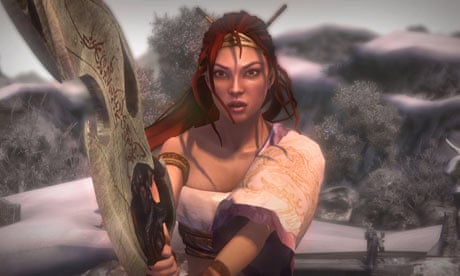Against: John Crace
Sci-fi has a nobler literary tradition than you might think. Doris Lessing, Iain Banks trading as Iain M Banks and Toby Litt have all turned their hand to it, so you can see why Edinburgh Napier University has chosen to run a creative writing MA in science fiction. But a module in creative writing for computer games seems a step too far.
Confession time: I'm quite partial to wasting hours on end blasting pixels on a computer screen. Half-Life, Tomb Raider, Call of Duty, F.E.A.R, Bioshock, Grand Theft Auto; I've beaten them all. But can I remember a thing about what happened in any of them? Can I hell.
Check out the trade mags, and you'll find endless nonsense written about the importance of storyline in computer games and how a brilliant plot separates the wheat from the chaff. Well, let's get something straight: what makes a great game are top-class graphics with an interactive world you can blow up, challenging puzzles and things to kill.
Yes, I know we are supposed to nod to narrative, and there are cut scenes linking different levels, but I can assure you that everyone I know takes the cut scenes literally. They cut them. You just press the return key or the space bar and get back to the action.
OK, so you may have gathered I'm more of a fan of first-person shooters and action games than the clumsily titled Massively Multiplayer Online Role-Playing Games (MMORPG) that usually feature complex fantasy worlds of elves and wizards and are the more usual staple diet of the sci-fi enthusiast. But I would be willing to bet that those who do play them have little real interest in the plot; all they really care about is collecting more nerdy special powers for their character than anyone else.
The game-play is everything. If it looks good and feels good on screen, you're on to a good thing. The best a writer can hope for is to provide an illusion of choice – the chimera of reaching an alternative scripted ending, but no one really cares just how linear a game is – take Half-Life – if you're having fun. Take it from me; if you're writing for computer games, you're writing in order not to be read.
For: Quin Parker
It's a widely held belief that if Charles Dickens were alive today, he would be working in television. But quite possibly, he might also be writing cut scenes for adventure games.
Nobody's suggesting that people need degrees to write "thank you Mario, but our princess is in another castle". The truth is, games have become enormously complex compared to the days when all you did was jump on mushrooms, collect gold, and blow things up. Different demographics of people are playing computer games, and they don't just demand realistic graphics that push technological boundaries, they want whole worlds and coherent stories.
Douglas Adams understood well how an idea could cross literary genres. The Hitchhiker's Guide to the Galaxy has had multiple incarnations – radio, book and eventually a film – but forgotten now is the interactive fiction game, written by Adams himself. In 1984, it sold 350,000 copies. And while Italo Calvino probably never touched a computer game, he is one of several writers to immerse the reader, not a character, in a world by writing in the second person.
Interactive fiction (IF) is probably the place where literature and games intersect most cleanly. Curses, by Graham Nelson, is a cerebral and whimsical epic that begins with the search for a lost map and spreads out through Eliot, Proust, and most of 20th-century literature. (Curses is huge, so newcomers to IF with an afternoon free could try the game Lost Pig, by Admiral Jota, in which you are a slow-witted caveman called Grunk on a quest for porcine reunion.)
Stories make games compelling, and interactive fiction is an old, old genre born in a time when computers were barely more functional than staplers.
There was a time that the closer a game's explosions and gore got to the rules of physics and biology, the better it was. I think graphics and sound bore people now, and a trend is starting for games to be heavy on story and deliberately light on flash. One of my favourite new games is Terry Cavanagh's Don't Look Back, based on the story of Orpheus. If you can, play it all the way to the end.

Comments (…)
Sign in or create your Guardian account to join the discussion